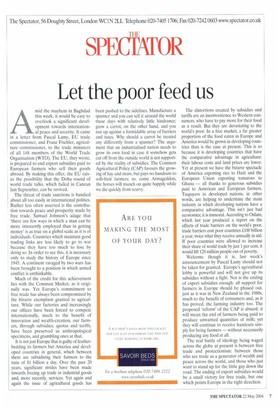Let the poor feed us
Amid the mayhem in Baghdad this week, it would be easy to overlook a significant development towards international peace and security. It came in a letter from Pascal Lamy, EU trade commissioner, and Franz Fischler, agriculture commissioner, to the trade ministers of all 148 members of the World Trade Organisation (WTO). The EU, they wrote, is prepared to end export subsidies paid to European farmers who sell their goods abroad. By making this offer, the EU raises the possibility that the Doha round of world trade talks, which failed in Cancun last September, can be revived.
The threat of trade sanctions is bandied about all too easily in international politics. Rather less often asserted is the contribution towards peace and prosperity made by free trade. Samuel Johnson's adage that 'there are few ways in which a man can be more innocently employed than in getting money' is as true on a global scale as it is of individuals. Countries which maintain good trading links are less likely to go to war because they have too much to lose by doing so. In order to see this, it is necessary only to study the history of Europe since 1945. A continent ravaged by two wars has been brought to a position in which armed conflict is unthinkable.
Much of the credit for this achievement lies with the Common Market, as it originally was. Yet Europe's commitment to free trade has always been compromised by the bizarre exemption granted to agriculture. While our factories and increasingly our offices have been forced to compete internationally, much to the benefit of innovation and wealth-creation, our farmers, through subsidies, quotas and tariffs, have been preserved as anthropological specimens, and grumbling ones at that.
It is not just Europe that is guilty of featherbedding its farmers but America and developed countries in general, which between them are subsidising their farmers to the tune of $1 billion a day. Over the past 20 years, significant strides have been made towards freeing up trade in industrial goods and, more recently. services. Yet again and again the issue of agricultural goods has been pushed to the sidelines. Manufacture a spanner and you can sell it around the world these days with relatively little hindrance; grow a carrot, on the other hand, and you run up against a formidable array of barriers and taxes. Why should a carrot be treated any differently from a spanner? The argument that an industrialised nation needs to grow its own food in case it somehow gets cut off from the outside world is not supported by the reality of subsidies. The Common Agricultural Policy (CAP) favours the growing of hay and straw, but pays no handouts to soft-fruit farmers: so, come Armageddon, the horses will munch on quite happily while we die quickly from scurvy. The distortions created by subsidies and tariffs are an inconvenience to Western consumers, who have to pay more for their food as a result. But they are devastating to the world's poor. In a free market, a far greater proportion of the food eaten in Europe and America would be grown in developing countries than is the case at present. This is so because it is developing countries that have the comparative advantage in agriculture: their labour costs and land prices are lower. Yet at present we have the bizarre spectacle of America exporting rice to Haiti and the European Union exporting tomatoes to Ghana — all thanks to generous subsidies paid to American and European farmers. Taxpayers in developed nations, in other words, are helping to undermine the main industry in which developing nations have a comparative advantage. This isn't just bad economics; it is immoral. According to Oxfam, which last year produced a report on the effects of trade barriers on the world's poor, trade barriers cost poor countries £100 billion a year, twice what they receive annually in aid. If poor countries were allowed to increase their share of world trade by just 1 per cent, it would lift 128 million people out of poverty.
Welcome though it is, last week's announcement by Pascal Lamy should not be taken for granted. Europe's agricultural lobby is powerful and will not give up its subsidies without a fight. Nor is the ending of export subsidies enough: all support for farmers in Europe should be phased out, just as it was in New Zealand in the 1980s, much to the benefit of consumers and, as it has proved, the farming industry too. The proposed 'reform' of the CAP is absurd: it will mean the end of farmers being paid to produce unwanted quantities of milk; yet they will continue to receive handouts simply for being farmers — without necessarily producing any food at all.
The real battle of ideology being waged across the globe at present is between free trade and protectionism: between those who see trade as a generator of wealth and peace across the world, and those who just want to stand up for the little guy down the road. The ending of export subsidies would be a small victory for free trade, but one which points Europe in the right direction.


















































































 Previous page
Previous page